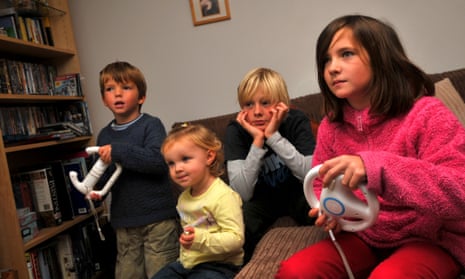“The new video-game world encourages doing and acting and not really thinking. Video games are not so attractive to girls.”
The American psychologist Philip Zimbardo has a new book out. It is called Man (Dis)connected: How Technology Has Sabotaged What It Means To Be Male. In Saturday’s Guardian, he spoke to Stuart Jeffries about his fears for young men who – he asserts – are increasingly withdrawing from real life and from sexual relationships with women, into an online world of games and pornography. “This thing with boys is really getting me down because I can’t think of a solution that is easy to entrain, that’s easy to realise,” he said. “It’s painful for me because I’m an optimistic person. Boys are in a mess.”
His book cites anecdotal evidence from teachers who are concerned about boys who play games into the night then turn up at school unable to learn. There is research from various academic institutions linking unregulated gaming with attention and behavioural problems. I don’t doubt the veracity of these studies and I don’t question that they highlight problems that our increasingly technological society will have to deal with. Parents have some serious work to do when it comes to gating pervasive devices like games consoles and smart phones. But I take huge issue with the projection of minority cases into a societal norm. I don’t recognise the gamers that Zimbardo is worrying about.
Over the last ten years there has been a profound change in the way people play video games. The cliche of the teenage boy hunched alone over a console, competing in solitude against computer foes, is outdated. The rise of broadband connectivity has engendered a new culture of shared experiences and co-operative play. These days, a game lives and dies by its ability to attract and maintain a talkative and engaged community. The whole meaning and purpose of video games has shifted: for many players, they have become venues for social interaction rather than solitary confinement.
Look at World of Warcraft, a massively multiplayer gamer that has created lifelong friendships, many of which spill out into real-world meet-ups; look at Eve Online, an online space game with a player-maintained economy, society and law system. Look at Destiny and its 17 million players who need to co-operate to garner the full experience. Look at the modding community that has surrounded first-person shooters for 20 years, creating new content for favourite titles. Look at hugely supportive and social communities that exist around trading games like Pokemon and Monster Hunter.
Zimbardo worries that boys are bored in an overtly feminised education system, and that high rates of divorce means they don’t have father figures to motivate them. He worries this means that boys are now retreating into insular hobbies, into gaming and porn. Ignored in all of this is the fact that primary education has been dominated by women teachers throughout the modern era. With the expansion of teacher training colleges in the 1950s and 1960s, HMSO education statistic show that around 70% of entrants were women – it’s a similar figure in the US. And boys have, let’s face it, always had solitary hobbies to withdraw into.
Even more tenuous is the idea that boys now completely lack societal role models. Zimbardo sees a popular culturing teeming with moodles (“man poodles”) and infantilised losers like the stars of Judd Apatow’s comedy movies. What he doesn’t seem to have kept up with is the rise of the aspirational geek. Sure, the muscle-bound alpha males of 80s action cinema have largely retired, but tech culture has brought us new figureheads – Mark Zuckerberg, Elon Musk, Biz Stone, Palmer Luckey – men who (whatever you personally think of them) reached the top through intelligence and industry, who read the prevailing tech trends and got it all right. David Fincher’s movie Social Network is effectively a modern-age take on Brian de Palma’s Scarface: the analysis of male aspiration and heroism as a symbol for its contemporary milieu. Geeks are heroes now, and they’re a lot more functional and relatable than the movie and sports stars we once adored.
I can’t help but feel that what Zimbardo expresses is a saner version of the fetid MRA assertion that men are being pushed out by society, that we’re somehow being sidelined; that the feminazis are taking over. And certainly the death of traditional industry in the West, together with complex new work patterns, is leading to an employment market that values different skillsets than those our fathers required. Add this to a culture that is increasingly questioning notions of masculinity and femininity – the online battles over Marvel’s depiction of women, the controversy over Anita Sarkeesian’s questioning of sexist video game tropes – and you have a complex and confusing environment of gender inquisition. Things are changing fast, and transition is frightening – as the recent election has shown us, grasping on to what is known and familiar is a natural human response.
As for video games not being as attractive to women, that’s dated too. The rise of smartphones as a habitual technology has seen a huge boost in the numbers of women playing and enjoying games. Research by the Internet Advertising Bureau last year found that 52% of British gamers are women. This isn’t an isolated blip and it isn’t just down to “casual” phone games like Candy Crush Saga. In the US, research specialist Super Data found that just over 50% of PC gamers are women. Senior researcher Stephanie Llamas wrote about how her data challenged the cliche that women only play casual titles – her female subjects identified mostly as “mid-core” and hardcore players.

Gamer communities certainly have their problems – the reaction to incoming feminist critics being one of them. But increasingly, they are active, welcoming and social – they meet online, through message boards, forums and sites like Reddit, and they meet in person through the large variety of casual and official events. They meet at huge gatherings like Blizzcon and Minecon; they meet at major conferences like Rezzed, Eurogamer Expo and Pax; they meet at LAN and eSports gaming tournaments. They come with groups of friends, they come with their partners and family members. They are super organised and engaged. They don’t just play games, they contribute. Through initiatives like the crowd-funding site Kickstarter and the Early Access collaborative development section on PC gaming service Steam, they communicate with developers, share ideas and help shape new projects.
I know of dozens of UK gaming events where players and developers get together to celebrate game culture. Wild Rumpus, GameCity, the forthcoming Feral Vector in Yorkshire. There are similar gatherings all around the world. I am certain there are still isolated individuals who play alone, but I am equally certain they are not representative. Games, increasingly, are not a hobby, they are a cultural force, no less or more than music and movies. They unite people – men, women, straight, gay, bi, trans – and they allow the dissemination of challenging ideas. Zimbardo told the interviewer that he wants to see games that are less about violence and more about co-operation – as if this is some kind of revelation. Minecraft, one of the biggest games in the world, has been doing this for five years. There are dozens of others. You want a positive community that challenges Zimbardo’s view of gaming? Look up (or just read about) the interactive fiction program, Twine.
If boys are in crisis, I don’t think they need their new interests to be blamed and vilified – they need what they’ve always needed: unconditional love and boundaries. Just like girls. Parents don’t need knee-jerk diatribes warning about some looming masculine armageddon – they need actual advice on managing new devices, and monitoring what their kids do. The odds have been stacked against women for so long, the mere idea that the scales may be tipping in their favour shouldn’t fill grown men with apocalyptic dread. Technology hasn’t sabotaged what it means to be male, but maybe it’s changing it, and we just have to deal with that.
What we mustn’t do is retreat into the welcoming arms of fear, paranoia and revisionist fantasy. If games are becoming a problem then we, as parents, have got to measure game time against other activities like having a kickabout in the park; we’ve got to balance shooting games with creative ones; we’ve got to learn about how our children communicate and socialise online. It’s tough, sometimes really really tough, but technology isn’t going anywhere. Thinking about games purely as an alien presence in the home that has to be feared and curtailed is the wrong mindset. They can be joyful and educational, and in moderation, they will provide a lively venue for family communication – an excuse to chat. It is about involvement, like most other things in parenthood.
Thinking about gamers as young boys lost and alone in their rooms is not only counter-productive and defeatist, it is also increasingly wrong. Good, positive things are already happening in games, they’ve been happening for years. Nobody needs another edifice of fear to gather around.

